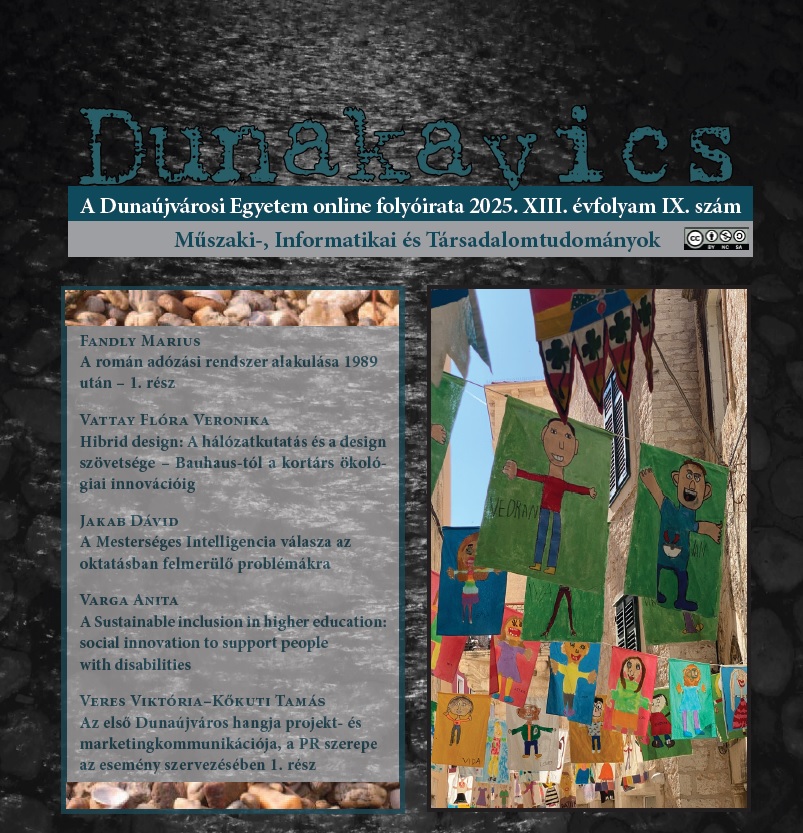Sustainable inclusion in higher education: social innovation to support people with disabilities
Abstract
The perception of social innovation and its place in higher education is increasingly central to the curricula and programmes of higher education institutions. The aim of this paper is to present some innovative approaches that promote social responsibility Educational methods can provide opportunities that allow students to engage in solving social problems while acquiring key competences such as problem solving, interdisciplinarity, and community partnership building.
Creating an inclusive university environment means not only infrastructure and technological improvements, but also comprehensive advisory and mentoring services for higher education institutions. Developments that focus on sustainability and social innovation have a significant impact on the inclusion of students with disabilities studying in institutions. These systems not only provide academic support, but also offer opportunities to facilitate the social inclusion of students and promote their psychosocial development. Guidance systems play a central role in ensuring sustainable inclusion, helping students with disabilities to adapt to the higher education environment and overcome various barriers.
In the needs assessment process, counselling plays a key role in creating an inclusive environment, with a focus on fostering a sense of community and addressing barriers. Higher education institutions should also implement pedagogical and counselling improvements to ensure that students with disabilities have equal opportunities to participate in university life. The development of various university guidance systems can be operated as a complex system, creating long-term economic and social value in addition to the successful integration of students with disabilities, and promoting the employability and autonomy of people with disabilities in the labour market .
References
Balázs, Z. (2018). Társadalmi innováció a helyi közösségek fejlesztésében: Magyarországi esettanulmányok. Budapest: Gondolat Kiadó.
Bauer, M. W., Biwer, P., & Semmler, J. (2020). Social innovation and higher education: New approaches in European universities. Springer.
Benneworth, P., & Cunha, J. (2015). Universities' contributions to social innovation: Reflections in theory & practice. European Journal of Innovation Management, 18(4), 508–527. https://doi.org/10.1108/EJIM-10-2013-0099
Burgstahler, S. (2015). Universal design in higher education: From principles to practice. Harvard Education Press.
Chesbrough, H. W. (2006). Open innovation: The new imperative for creating and profiting from technology. Harvard Business School Press.
Elkington, J. (2004). Enter the triple bottom line. In A. Henriques & J. Richardson (Eds.), The triple bottom line: Does it all add up? (pp. 1–16). Earthscan Publications.
European Commission. (2020). Education and Training 2020: Inclusive education for all. European Union Publications.
European Commission. (2020). Social innovation as a pathway to a sustainable future. European Commission. Retrieved from https://ec.europa.eu/
European Commission. (2021). European Social Innovation Competition. Retrieved from https://ec.europa.eu/social/main.jsp?catId=1147
European Commission. (2021). European Solidarity Corps. Retrieved from https://europa.eu/youth/solidarity
European Solidarity Corps. (2021). European Solidarity Corps Guide 2021–2027. European Commission. Retrieved from https://europa.eu/youth/solidarity/mission_en
Etzkowitz, H., & Leydesdorff, L. (2000). The dynamics of innovation: From national systems and “Mode 2” to a Triple Helix of university–industry–government relations. Research Policy, 29(2), 109-123. DOI: 10.1016/S0048-7333(99)00055-4
Falus, I., & Németh, T. (2024). Oktatási esélyegyenlőség és társadalmi innováció: Kutatási eredmények és gyakorlati megközelítések. Debreceni Egyetemi Kiadó.
Falus, O., & Dósáné Pap, Gy. (2024). Az innováció jogi védelme: Példák az elektromobilitás köréből. In Falus, O., & Németh, I. P. (Eds.), Innovációs terek (pp. 135-143). Dunaújváros: DUE Press.
Gilardone, M., & Sen, A. K. (2010). The idea of justice. Social Choice and Welfare, 709-720. Harvard University Press.
Havas, A., & Nyíri, L. (2017). A társadalmi innovációk lehetőségei Magyarországon. Közgazdasági Szemle, 64(7-8), 726-750.
Kálmán, A., & Hübner, L. (2020). A digitális esélyegyenlőség kihívásai a magyar felsőoktatásban. Neveléstudomány, 8(3), 67–79.
Kálmán, A., & Kővári, B. (2018). Az egyetemes tervezés szerepe a magyar felsőoktatási intézményekben. Felsőoktatási Kutatóintézeti Szemle, 14(2), 45–58.
KIM (2024). A Kulturális és Innovációs Minisztérium Fogyatékosügyi koordinátori találkozó online 2024.06.11.
Kocziszky, G., Veresné Somosi, M., & Balaton, K. (2015). A társadalmi innováció vizsgálatának elméleti alapjai és módszertana. Miskolc: Miskolci Egyetem Gazdaságtudományi Kar.
Kozma, T. (2019). A társadalmi innováció értelmezései. Kultúra és Közösség, 10(1), 5-11.
Kozma, T., & Radácsi, L. (2013). Társadalmi innováció és felsőoktatás: A felelősségvállalás lehetőségei a magyar felsőoktatásban. Pécs: Pécsi Tudományegyetem Kiadó.
Kozma, T., & Rébay, M. (2021). Social inclusion in higher education: Challenges and opportunities. Hungarian Educational Research Journal, 11(2), 133-147.
Kuti, É. (2018). Társadalmi innováció és társadalmi vállalkozások. Új Mandátum Kiadó.
Mulgan, G. (2006). The process of social innovation. Innovations: Technology, Governance, Globalization, 1(2), 145-162.
Mulgan, G. (2012). The theoretical foundations of social innovation: The social origins of creativity and effectiveness. Palgrave Macmillan.
Mulgan, G. (2019). Social innovation: How societies find the power to change. Policy Press.
Nagy, J. T. (2021). The impact of social responsibility in higher education: A case study on Hungarian universities. Journal of Educational Policy and Development, 39(5), 168-181. https://doi.org/10.1080/02680939.2021.1810189
Nussbaum, M. (2011). Creating capabilities: The human development approach. Harvard University Press.
Pataki, G. (2012). A fenntarthatóság közgazdasági alapjai. Köz-Gazdaság, 7(2), 25-38.
Pérez, A., Sánchez, M., & Rodríguez, P. (2021). Social innovation and sustainable inclusion in higher education: The role of counseling and mentoring. Journal of Higher Education, 45(3), 204-220. https://doi.org/10.1016/j.jhe.2021.02.003
Porter, M. E., & Kramer, M. R. (2011). Creating shared value. Harvard Business Review, 89(1-2), 62-77.

This work is licensed under a Creative Commons Attribution-NonCommercial-ShareAlike 4.0 International License.




